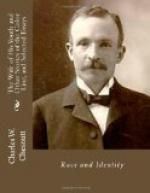“We expect to show, gentlemen of the jury, the facts set out in the indictment,—not altogether by direct proof, but by a chain of circumstantial evidence which is stronger even than the testimony of eyewitnesses. Men might lie, but circumstances cannot. We expect to show that the defendant is a man of dangerous character, a surly, impudent fellow; a man whose views of property are prejudicial to the welfare of society, and who has been heard to assert that half the property which is owned in this county has been stolen, and that, if justice were done, the white people ought to divide up the land with the negroes; in other words, a negro nihilist, a communist, a secret devotee of Tom Paine and Voltaire, a pupil of the anarchist propaganda, which, if not checked by the stern hand of the law, will fasten its insidious fangs on our social system, and drag it down to ruin.”
“We object, may it please your Honor,” said the defendant’s attorney. “The prosecutor should defer his argument until the testimony is in.”
“Confine yourself to the facts, Major,” said the court mildly.
The prisoner sat with half-open mouth, overwhelmed by this flood of eloquence. He had never heard of Tom Paine or Voltaire. He had no conception of what a nihilist or an anarchist might be, and could not have told the difference between a propaganda and a potato.
“We expect to show, may it please the court, that the prisoner had been employed by Colonel Thornton to shoe a horse; that the horse was taken to the prisoner’s blacksmith shop by a servant of Colonel Thornton’s; that, this servant expressing a desire to go somewhere on an errand before the horse had been shod, the prisoner volunteered to return the horse to Colonel Thornton’s stable; that he did so, and the following morning the whip in question was missing; that, from circumstances, suspicion naturally fell upon the prisoner, and a search was made of his shop, where the whip was found secreted; that the prisoner denied that the whip was there, but when confronted with the evidence of his crime, showed by his confusion that he was guilty beyond a peradventure.”
The prisoner looked more anxious; so much eloquence could not but be effective with the jury.
The attorney for the defendant answered briefly, denying the defendant’s guilt, dwelling upon his previous good character for honesty, and begging the jury not to pre-judge the case, but to remember that the law is merciful, and that the benefit of the doubt should be given to the prisoner.
The prisoner glanced nervously at the jury. There was nothing in their faces to indicate the effect upon them of the opening statements. It seemed to the disinterested listeners as if the defendant’s attorney had little confidence in his client’s cause.
Colonel Thornton took the stand and testified to his ownership of the whip, the place where it was kept, its value, and the fact that it had disappeared. The whip was produced in court and identified by the witness. He also testified to the conversation at the blacksmith shop in the course of which the prisoner had expressed a desire to possess a similar whip. The cross-examination was brief, and no attempt was made to shake the Colonel’s testimony.




